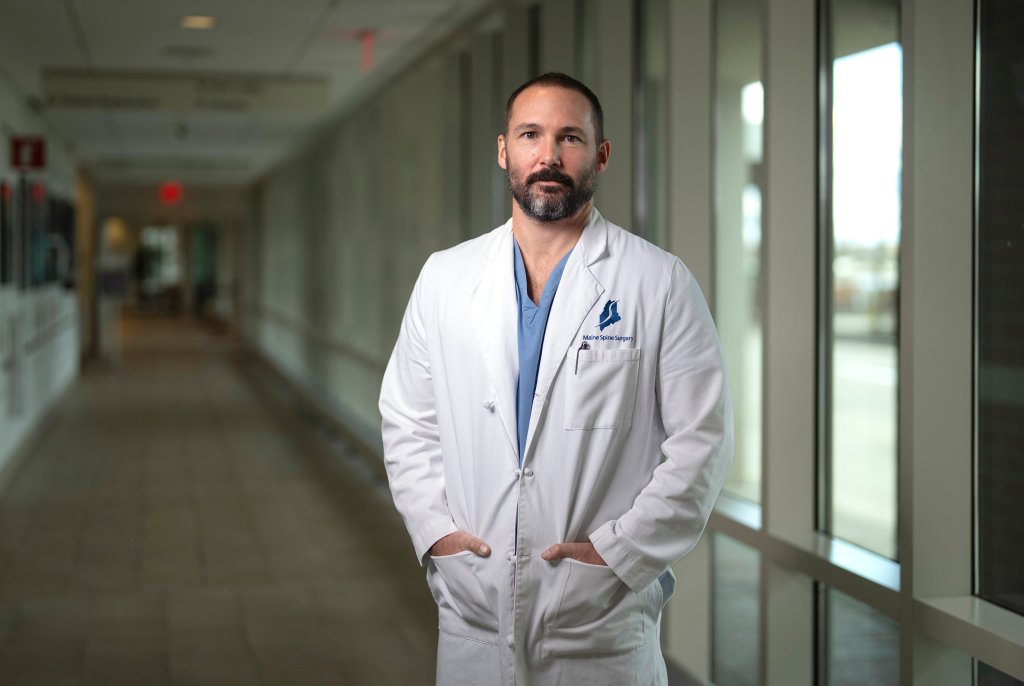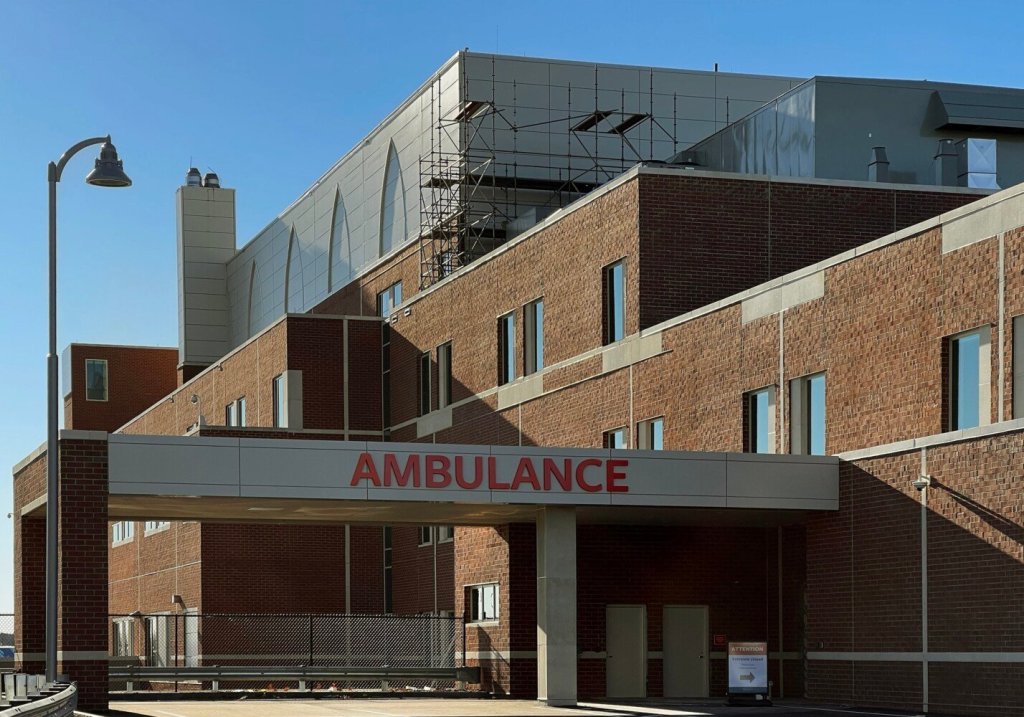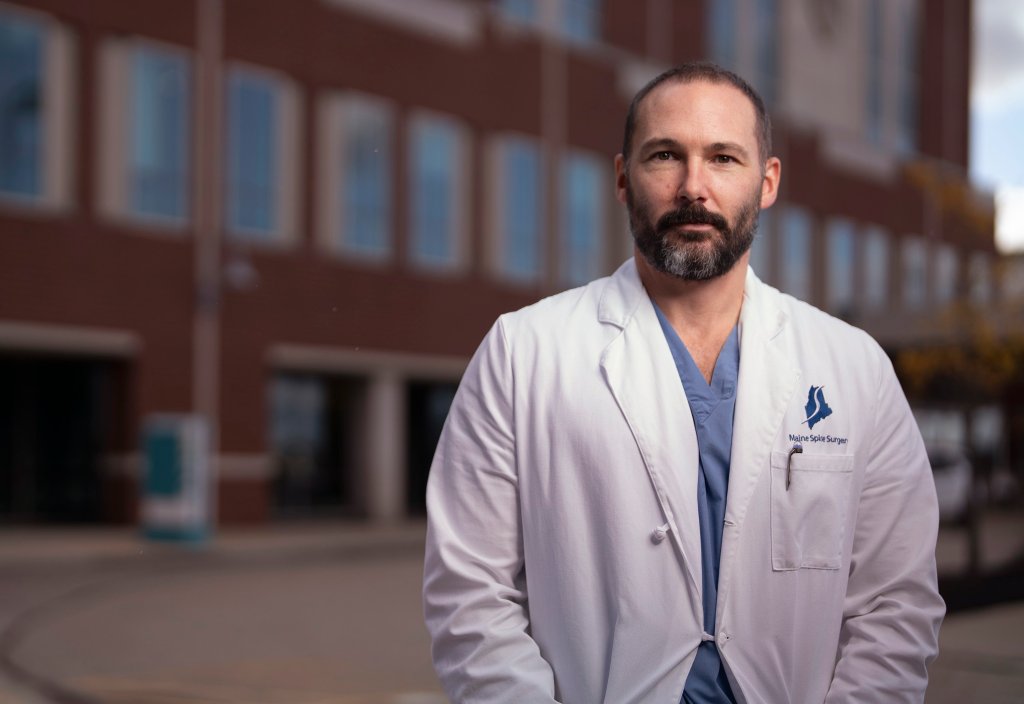
PORTLAND — Dr. Lynn McGrath held up a plastic model of the spine in his office at Northern Light Mercy Hospital, pointing to tiny areas of bone and nerves to demonstrate how spinal surgeries can be as minimally invasive as possible.
His talents aren’t just helping fix backs in Maine.
McGrath is one of the founding doctors of Return to Duty, a national nonprofit organization that helps active duty and retired members of the U.S. military’s special forces — Navy SEALs, Army Green Berets, Army Rangers and others — receive top-notch spinal care.
“The idea is: ‘Why can’t we get these guys the best care?’ Out of all the guys who need help, these are among the most deserving cohort, for what they’ve done for our country,” McGrath said in an interview at the hospital last week.
The 40-year-old New Jersey native moved to Maine 18 months ago with his wife, who is also a doctor. He specializes in endoscopic spinal surgeries, using a tube, tiny camera and a small incision to reach the spine, where he then shaves off tiny portions of arthritic bone, alleviating pressure on pinched nerves.
McGrath said endoscopic surgery is often a better alternative for patients than spinal fusion surgery, which is effective but can reduce range of motion and flexibility. And for active duty special forces members, the military forbids them from returning to their normal duties if they’ve had the spinal fusion procedure because it results in reduced functioning.
Patients who get less-invasive surgeries through the nonprofit, however, can often “return to duty.”
Unfortunately, McGrath said, there aren’t many like him who perform the endoscopic spinal surgeries. He estimates only about 1 in 5 spinal surgeries are done endoscopically.

‘STILL PAIN BUT I CAN FUNCTION’
Nathan Alway, director of military outreach with Return to Duty, said because of the rigorous nature of their jobs, about 80% of special forces members have had a back injury at some point. Not everyone needs surgery, but Return to Duty also helps them access other care, such as spinal injections and physical therapy.
Alway said the Defense Department doesn’t have enough surgeons who can do minimally invasive surgeries needed to avoid spinal fusions. That means the wait for care can be long.
“We’re not blaming anyone. It’s just the reality of how many surgeons the (Defense Department) has and what they are trained on,” he said.
Dr. Kaushal Bhatt, medical affairs director for Return to Duty, said a group of physicians will meet about each patient and determine the best course of treatment. If surgery is needed, they’ll try to get the patient to the closest physician in the Return to Duty network.
McGrath helps devise treatment plans for each patient, and estimates he’s done about 10 spinal surgeries with the nonprofit to date. Those were all done in New York City, but he said any future surgeries would be performed at Mercy.
“Everyone puts aside their own individual egos and decides on the optimal treatment for the patient,” Bhatt said. “Dr. McGrath is a phenomenal physician, surgeon and person, and I’ve been fortunate to work with him since the very beginning of Return to Duty (in 2022).”
During that time, about 500 military members — including active duty, reservists and retired — have been helped in some way, either through surgery or other treatment.
One of those patients is Jonas “Monty” Johnson, who said he needed more surgeries because he was still in severe pain after a spinal fusion surgery in 2023.
Johnson, 58, a retired chaplain for the Green Berets, said Return to Duty “quite literally saved my life.”
“I was basically in bed all day and in severe pain, taking a lot of pain medications,” he said.
Johnson, who lives in Joplin, Missouri, was not personally treated by McGrath, but he said after two operations by Return to Duty surgeons, including the most recent one in March, he feels much better.
“There’s still pain, but I can function. I can walk around. I can live,” said Johnson, who has two titanium rods and “other hardware” in his spine.
‘INCREDIBLY MEANINGFUL’

Johnson wasn’t a candidate for endoscopic surgery, but McGrath said he hopes the less-invasive surgeries become more common over time. He said endoscopic surgeries have better results for patients, who can live more-normal lives with close to the same functioning as before they were injured.
“Our goal is to leave as much healthy tissue as undisturbed as possible,” McGrath said. “We want it so that patients are not losing range of motion, not at risk of accelerated arthritis or of destabilizing the spine.”
Alway said doctors like McGrath donate their time for the surgeries, and Return to Duty patients don’t have any out-of-pocket costs.
McGrath grew up in Moorestown, New Jersey, near Philadelphia, and lived in New York City before moving to Maine. He said he used to vacation in York, and always wanted to live in Maine. When the job at Mercy Hospital opened up and he was hired, he and his wife, Dr. Anika McGrath, and their three young children moved to Falmouth. Being so close to surfing, sailing and skiing is a big plus, he said.
McGrath said he plans to continue working with Return to Duty because he’s motivated to help special forces members live as normal a life as possible after spine injuries.
“It’s incredibly meaningful to do this work,” he said. “If we can have them lead a more enjoyable life, that’s a big win.”

We invite you to add your comments. We encourage a thoughtful exchange of ideas and information on this website. By joining the conversation, you are agreeing to our commenting policy and terms of use. More information is found on our FAQs. You can modify your screen name here.
Comments are managed by our staff during regular business hours Monday through Friday as well as limited hours on Saturday and Sunday. Comments held for moderation outside of those hours may take longer to approve.
Join the Conversation
Please sign into your CentralMaine.com account to participate in conversations below. If you do not have an account, you can register or subscribe. Questions? Please see our FAQs.